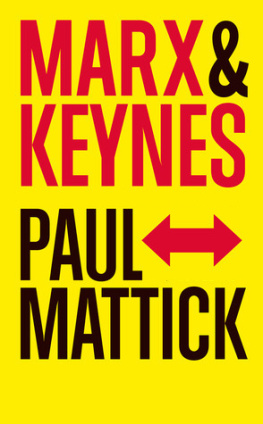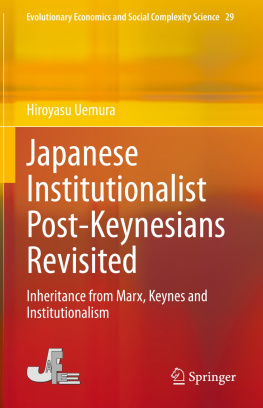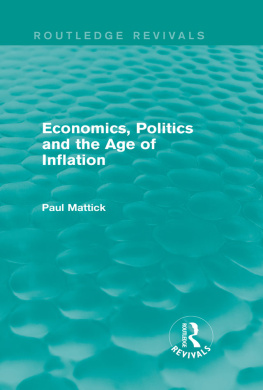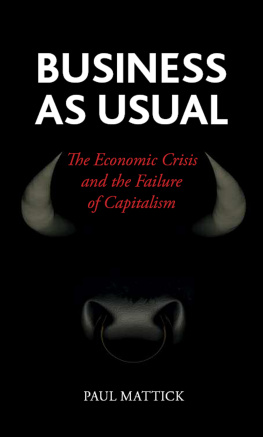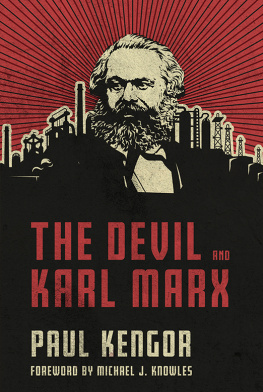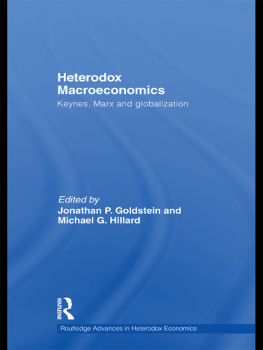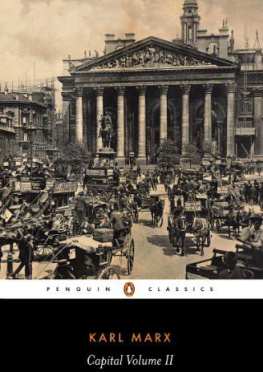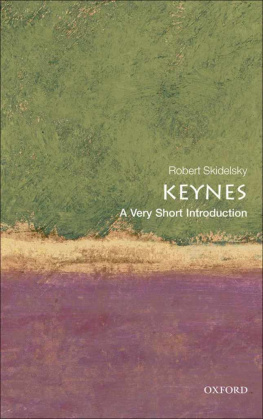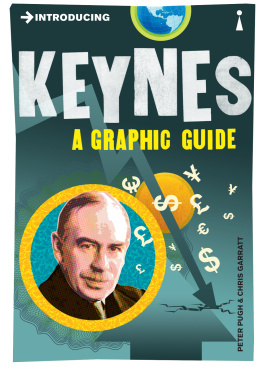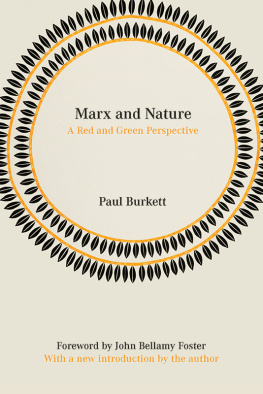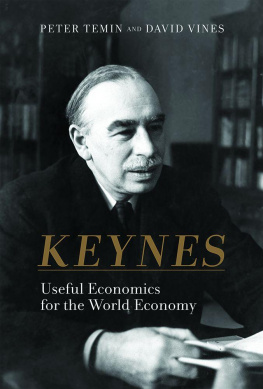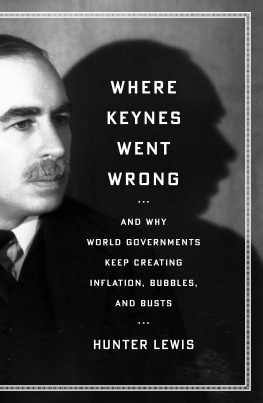Paul Mattick - Marx and keynes : the limits of the mixed economy.
Here you can read online Paul Mattick - Marx and keynes : the limits of the mixed economy. full text of the book (entire story) in english for free. Download pdf and epub, get meaning, cover and reviews about this ebook. City: Place of publication not identified, year: 1970, publisher: Extending Horizons Books, genre: Science / Politics. Description of the work, (preface) as well as reviews are available. Best literature library LitArk.com created for fans of good reading and offers a wide selection of genres:
Romance novel
Science fiction
Adventure
Detective
Science
History
Home and family
Prose
Art
Politics
Computer
Non-fiction
Religion
Business
Children
Humor
Choose a favorite category and find really read worthwhile books. Enjoy immersion in the world of imagination, feel the emotions of the characters or learn something new for yourself, make an fascinating discovery.
- Book:Marx and keynes : the limits of the mixed economy.
- Author:
- Publisher:Extending Horizons Books
- Genre:
- Year:1970
- City:Place of publication not identified
- Rating:3 / 5
- Favourites:Add to favourites
- Your mark:
- 60
- 1
- 2
- 3
- 4
- 5
Marx and keynes : the limits of the mixed economy.: summary, description and annotation
We offer to read an annotation, description, summary or preface (depends on what the author of the book "Marx and keynes : the limits of the mixed economy." wrote himself). If you haven't found the necessary information about the book — write in the comments, we will try to find it.
Marx and keynes : the limits of the mixed economy. — read online for free the complete book (whole text) full work
Below is the text of the book, divided by pages. System saving the place of the last page read, allows you to conveniently read the book "Marx and keynes : the limits of the mixed economy." online for free, without having to search again every time where you left off. Put a bookmark, and you can go to the page where you finished reading at any time.
Font size:
Interval:
Bookmark:
Marx and Keynes: The Limits of the Mixed Economy
Paul Mattick
INTRODUCTION
This book was written during a time hailed by the President of the United States as the greatest upsurge of economic well-being in history. Others, in other nations, spoke of an economic miracle, or else claimed that we never had it so good. Professional economists were overjoyed that their dismal science had finally turned out to be the hope of the world. They impressed governments and businessmen alike with their theoretical erudition and its practical applicability. With the unfortunate exception of an inarticulate minority, from the High down to the Low there was general agreement that business was excellent and that it would stay that way. There was some concern with a residue of poverty and with the few bottle-necks of unemployment which still marred the other wise beautiful face of Western prosperity; and there was something more than just concern with the unsolved problem of underdevelopment which prevented the large part of the world from partaking in the general prosperity. But some day the poor nations too would take off and emulate Western success, and the blessings of capitalism would spread over all the globe.
Although I have witnessed this period of unprecedented prosperity, I also experienced the Great Depression between the two world wars. At that time, confidence in the resilience of capitalism was at a low ebb and theories abounded regarding its decline and predicting its certain demise. Marxism was once again in the ascendancy, if only as an expression of a growing discrepancy between capitalist ideology and reality. The climate of despair was ended by government interventions in the economy and by World War II. Meanwhile, John Maynard Keynes had evolved his theory, which suggested monetary and fiscal policies capable of assuring full employment in a stagnating capitalist economy. Governments applied the Keynesian suggestions to secure some measure of social and economic stability in their nations. Because these endeavors proved successful, an old slogan was modified to proclaim that we are all Keynesians now.
It is my contention that the Keynesian solution to the economic problems that beset the capitalist world can be of only temporary avail, and that the conditions under which it can be effective are in the process of dissolution. For this reason the Marxian critique of political economy, far from having lost its pertinency, gains new relevance through its ability to comprehend and transcend both the old and the new economics. I shall subject Keynesian theory and practice to a Marxian critique, and beyond that, I shall try to elucidate political and economic events and trends with the aid of Marxian analysis.
This book is not presented as a consecutive narrative, however; various of its parts have been written on different occasions and at different times. These are necessary parts and all of them relate to the single theme of the mixed economy and to the differences between Keynes and Marx. There is some unavoidable overlapping and even repetition which, I hope, will enhance rather than encumber the books readability.
The Keynesian Revolution
The theories of bourgeois economists down to David Ricardo were developed before there was a real awareness of the class issues that dominate capitalist society. Ricardo, as Marx wrote, made the antagonism of class interests, of wages and profits, of profits and rent, the starting point of his investigations, naively taking this antagonism for a social law of nature. But by this start the science of bourgeois economy had reached the limits beyond which it could not pass, [1] for a further critical development could lead only to the recognition of the contradictions and limitations of the capitalist system of production. By doing what could not be done by bourgeois economists, Marx felt himself to be the true heir, and the destroyer as well, of bourgeois economy.
Though bourgeois economy was indeed unable to advance as Marx had said, it was able to change its appearance. Classical economists had emphasized production and the system as a whole. Their followers emphasized exchange and individual enterprise. Economic theory became increasingly apologetic until the whole problem of the social relations that underlie economic processes was done away with through the rejection of the classical value theory in favor of the subjective value concept of the marginal-utility school. Increasing economic difficulties, however, created an interest in the business cycle, in the factors that make for prosperity, crisis, and depression. The neo-classical school, whose best-known proponent was Alfred Marshall, attempted to transform economy into a practical science; it sought ways and means to influence market movements and to increase both the profitability of capital and the general social welfare.
In the midst of the Great Depression there appeared John Maynard Keynes work, The General Theory of Employment, Interest and Money , which was soon hailed as a revolution in economic thought and which led to the formation of a school of Keynesian economics. While persistent orthodox economists opposed this school as either socialistic or illusory, inconsistent socialists attempted to blend Marx with Keynes, accepting Keynes theories as the Marxism of our time. Marxs skepticism about the future of bourgeois society was now said to indicate only his inability or unwillingness to criticize the classicists constructively. And of Keynes it was said that he made real Alfred Marshalls aspirations for a reformed and improved capitalism.
John Maynard Keynes popularity is of long standing and was created by his book The Economic Consequences of the Peace . Keynes opposed the harshness of the Versailles Treaty because around Germany as a central support the rest of the European economic system grouped itself, and on the prosperity and enterprise of Germany the prosperity of the rest of the Continent mainly depended. [2] It was suggested that Keynes conciliatory reasoning was motivated by his fear of an anti-capitalist revolution in the wake of the war. Others suspected that his constructive proposals with regard to the peace were merely subtle ways of furthering British post-war foreign policies. Though these two concerns undoubtedly played a part in the formulation of his opinion, Keynes opposition to the treaty was based mainly on economic considerations and was determined by his conviction that the capitalist world could operate rationally.
The war itself was to Keynes only an accidental and unhappy interlude in the liberalistic process of capital formation. In 1919, he feared an impairment of capital accumulation because the laboring classes may no longer be willing to forego so largely, and the capitalist classes, no longer confident of the future, may seek to enjoy more fully their liberties of consumption so long as they last, and thus precipitate the hour of their confiscation. [3] The disturbed accumulative habits had to be restored; for at this time Keynes still unreservedly favored the inequality of the distribution of wealth as the best means for a vast amassing of capital. With the wars end he expected a return to international free trade and unlimited investment opportunities. The simplest way to restore normalcy was, of course, to reinstitute pre-war conditions. This implied treating Germany as if there had been no war at all.
But after experiencing the period of war-socialism in England and on the Continent and witnessing the Bolshevik experiment in Russia, Keynes ceased to think that capitalism was restricted to laissez-faire economics; in fact, he now considered laissez-faire a legend, a bit of metaphysical thinking. He was convinced that the capitalist economy could be regulated so as to function better with out losing its capitalist character. And if the national economy could be steered into definite, desirable channels, it might also be coordinated with the economic needs of the world. Because schemes of control were conceivable, Keynes was confident that their practical realization merely depended upon the presence of wise men of good will. He believed in the supreme value of intellectual leadership, in the wisdom of the chosen few, [4] and in their ability to influence the economic processes in a socially satisfactory way.
Next pageFont size:
Interval:
Bookmark:
Similar books «Marx and keynes : the limits of the mixed economy.»
Look at similar books to Marx and keynes : the limits of the mixed economy.. We have selected literature similar in name and meaning in the hope of providing readers with more options to find new, interesting, not yet read works.
Discussion, reviews of the book Marx and keynes : the limits of the mixed economy. and just readers' own opinions. Leave your comments, write what you think about the work, its meaning or the main characters. Specify what exactly you liked and what you didn't like, and why you think so.

